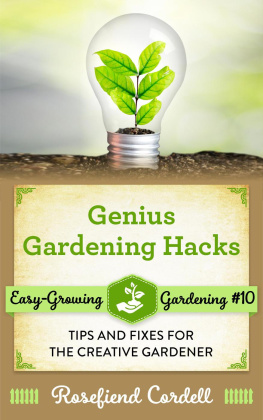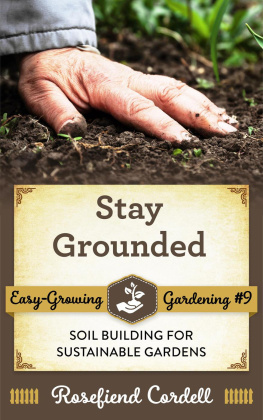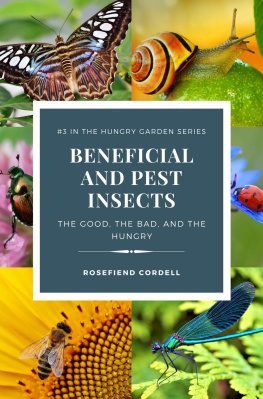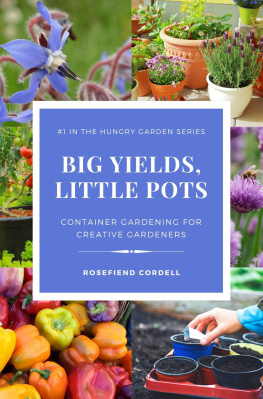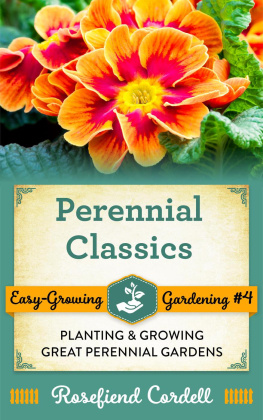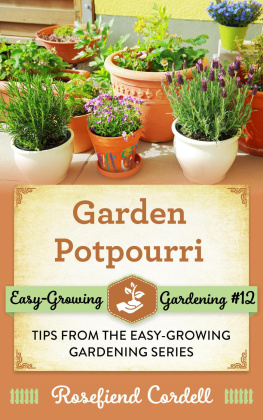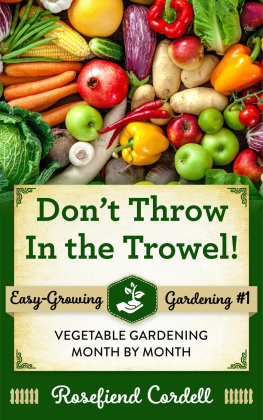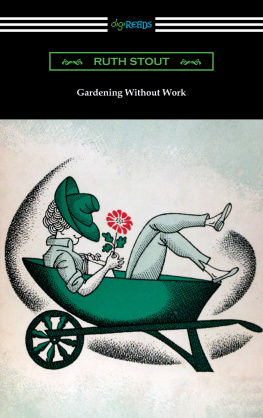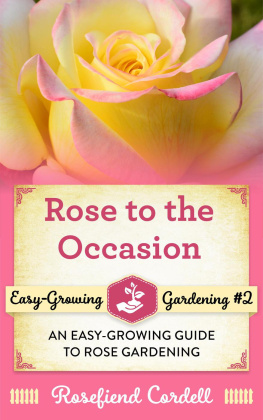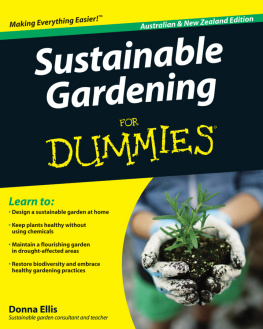Genius Gardening Hacks:
Tips and Fixes for the Creative Gardener

Easy-Growing Gardening Series #10
Melinda R. Cordell

Rosefiend Publishing
Copyright 2018 Melinda R. Cordell
All rights reserved.
Although the author has made every effort to ensure that the information in this book was correct at press time, the author does not assume and hereby disclaims any liability to any party for any loss, damage, or disruption caused by errors or omissions, whether such errors or omissions result from negligence, accident, explosions, drunken raccoons, the wrath of Khan, tiny bugs, bulldozer races, or any other cause.
Visit me at melindacordell.com
Also by Rosefiend Cordell
Easy-Growing Gardening
Don't Throw in the Trowel
Rose to the Occasion
If You're a Tomato I'll Ketchup With You
Perennial Classics
Petal to the Metal
Design of the Times
Leave Me a Lawn
Japanese Beetles and Grubs: Trap, Spray, and Control Them
Stay Grounded: Soil Building for Sustainable Gardens
Genius Gardening Hacks: Tips and Fixes for the Creative Gardener
Gardening Month by Month: Tips for Flowers, Vegetables, Lawns, & Houseplants
Garden Potpourri: Gardening Tips from the Easy-Growing Gardening Series
The Hungry Garden
Big Yields, Little Pots: Container Gardening for Creative Gardeners
Edible Landscaping: Foodscaping and Permaculture for Urban Gardeners
Beneficial and Pest Insects: The Good, the Bad, and the Hungry
Watch for more at Rosefiend Cordells site.

Gardens are not made by singing Oh, how beautiful, and sitting in the shade. Rudyard Kipling

F or squash, zucchini , or other garden plants afflicted by cutworms or borers, wrap a little aluminum foil around the plants stem tightly enough to keep the pests out.
Add two tablespoons of light cooking oil to every gallon of organic insect spray. This will help suffocate aphids and other insect pests that are hit with this spray. Note: Dont spray oil mixes when its over 90 degrees outside, as this adversely affects plants.
If you find slugs in your garden munching holes in your favorite plants, set out some saucers of beer for them. It might feel like youre rewarding the slugs for their bad behavior. Au contraire. The slugs get drunk and fall into the beer and drown. You might have to go outside twice a day and pick up the slugs that havent drowned and toss them in a bucket of soapy water. Also, at the end of the day, you might dump the beer out so you dont invite hordes of drunken raccoons into your yard.
Japanese beetles can be knocked into a container of soapy water to kill them. Cover the Japanese beetles as they fall in because sometimes they fly away before they hit the water. If you have chickens, dont add soap to the water just collect the beetles, then pour the water and beetles into their water dish for them to snap up.

D eter slugs and snails by laying coffee grounds around your plants. You can also pour out the coffee you didnt drink around your soil. Snails and slugs avoid caffeinated soil, and a 1 to 2 percent caffeine solution will kill them. (Instant coffee contains .5 percent caffeine; brewed coffee contains more.) Slugs hit with caffeine fall to uncoordinated writhing before they perish.
A third way to get slugs and snails is with chalk. Chalk pictures drawn on the sidewalk make slugs explode. Grab your kids sidewalk chalk, scribble all over a rock or a board, then put it under your hostas or cabbages where the slugs can crawl over it. Re-chalk everything each time it rains. Diatomaceous earth has the same effect on these and other critters.

O ld milk, in a 50/50 mild/water blend, makes an effective fungicide for roses.
Charles Anctil, the late rosarian who I still miss, always sprayed his roses and plants with a blast of water from the hose to knock pests off the plants. Its an organic way to clean up insects, and it doesnt bother the plants.
If the cat keeps using your garden as a litter box, stick a bunch of plastic forks, tines up, in your garden. Or gather up a lot of pine cones and use them as mulch. The cats are not a fan of walking on pine cones.
If voles and mice keep devouring your flower bulbs underground, you have several options. Surround each bulb with grit as you plant them, as rodents dont like digging through stones. Dig a trench, line it with chicken wire, lay the bulbs in it, wrap the chicken wire around them, then cover them with dirt. Or, place the bulb in a strawberry carton, place a second one on top, and plant them that way.

H ave a kitchen shaker filled with diatomaceous earth. (Obviously, please do not leave this shaker in the kitchen.) Diatomaceous earth consists of millions of diatoms microscopic, razor-edged remains of ancient sea organisms. Chalk is made of diatoms, which is why a chalk drawing will effectively kill a slug that slides across it. These diatoms cut through the slimy coat of slugs or the waxy coat of insects, causing them to dry out and die. At any rate, a kitchen shaker filled with DE can be shaken around hostas or other plants that are being attacked by pests, a nice and tidy way to distribute this pest killer.
Hang old CDs and DVDs in your fruit trees or strawberry patch to scare away birds and squirrels. Hang them so they dangle and twirl in the breeze. This also works with aluminum pie tins.

F ive different forms of the same aphid.
Soft-bodied insects (aphids, caterpillars, etc.) can be cleaned up with soapy water pretty handily. Ive had success in pouring a bucket of soapy water directly over the afflicted plant in cleaning up a number of these pests. The soapy water will need to be reapplied a few times to catch any pests that were hiding under a leaf or stem in the initial application.
On the other hand, birds are great pest control in the garden. One afternoon in the rose garden, I noticed a sparrow grabbing something off a rose with her bill and throwing it to the ground, and then she hopped down after it. It turned out to be a rose slug (i.e. a sawfly larvae), and she was picking them off the plant, throwing them down, then hopping down to eat them.
Next page
